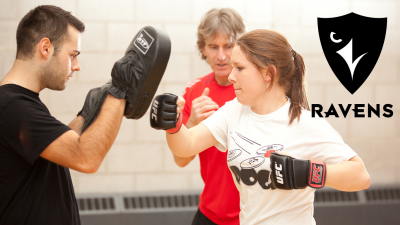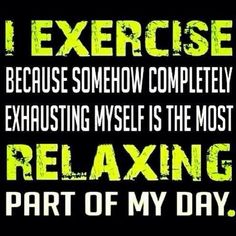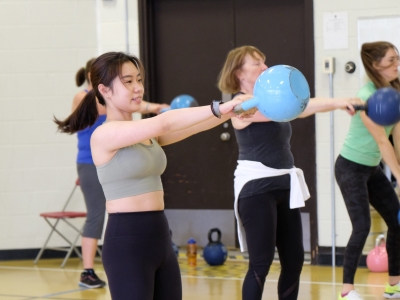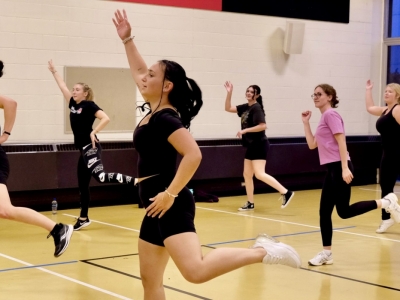
By Adam Stone
If you’re reading this, chances are you are sitting down, possibly during a lunch break, before class, or maybe even on the bus, probably during the precious spare time that you have. You may have read some of the articles in this issue and thought to yourself, “all these things sound great, but I just don’t have the time to do them!” If your train of thought even somewhat resembles this, then don’t despair, this article is for you.
Students and workers out in the real world alike will inevitably find themselves at some point in their busy lives at the mercy of others’ requests and deadlines, leaving no time to take care of oneself. This can often make people, and their agendas, feel bloated and misused. However, with a little guidance, improving one’s health and fitness can come at little cost to time that would be otherwise spent relaxing or unwinding. In fact, improving fitness may just be the answer.
When I refer to fitness,
I am not specifically referring to just looking good in front of a mirror or on the beach (although that can be a wonderful benefit). I am instead referring to areas of physical performance that can make tasks in daily living a little easier, from walking upstairs to staying awake during meetings. These areas include, but are certainly not limited to:
Agility – Muscular Strength – Endurance – Balance – Flexibility – Posture
Overall, improving these things serve to improve your standard of living, as they make often unavoidable activities from sitting at a desk to running to catch the bus less painless and more enjoyable. Sticking to an exercise routine can improve discipline, be useful as a way of blowing off steam, and a great way to meet people. A recent study from the University of Georgia found that improving overall fitness was an excellent means to reducing fatigue and boosting energy levels, while the Mayo Clinic reported in 2012 that exercise in any form is an excellent means to reduce stress. Canoe.ca reported that regular exercise is an excellent aid in quitting smoking, and a British Study at Loughborough University found that it can also help regulate appetite, encouraging healthier eating habits. I could literally talk about the lifestyle benefits of regular exercise all day, but that wouldn’t be very useful in getting you started with an actual fitness routine. So instead, I’ve got some advice that may be helpful for getting you on the right track.

1. Don’t worry, you don’t need to spend 2 hours a day in the gym. Health Canada recently reported that 20 minutes of daily fitness-related activity is enough to dramatically improve physical fitness levels and overall health. That does not necessarily mean you need to go to a gym, nor does it mean you need to do the 20 minutes all at once (although doing both are very beneficial). This could mean using the stairs instead of the elevator, parking further away from your destination, or getting off a couple of stops before where you regularly do. This is a great way to get on the right track, and a simple way to boost energy levels, but it doesn’t stop there.
2. Set goals. Realistic goals. Unless you join the army or start athletic conditioning, maybe lifting 200 pounds or looking like Chris Hemsworth isn’t a good goal to strive for, at least at first. Instead, set small goals for yourself that are easily attainable. This could mean lasting that extra minute on the treadmill, adding 3 pounds to a weight exercise, or walking to get lunch instead of driving. Achieving these goals feels great, is good for you, and helps encourage further goals to be set.
3. If you want cheap expert advice and training, go to a gym. Not only are gyms a great place to meet like-minded people, but they are usually inexpensive, plentiful, and have fitness experts in their ranks. With a vast variety of equipment, gyms have machines and exercises that allow you to assume any posture, and work any body part. To keep you on the right track, hire a personal trainer, or bring a friend who is either knowledgeable, eager to improve fitness, or both!
4. Have fun. Although this may seem trivial, you probably won’t stick to a routine that you find boring, useless, and don’t get paid for! My advice for you is to keep things new and exciting. Try new exercises once in a while, don’t do anything that causes you pain, bring a friend or join a team, and give yourself rewards after working out, as long as they don’t counter-act the benefits of exercise. If you end up having fun, your exercise may become the reward.
It is important to keep in mind that even with the best advice personal trainers and fitness experts have to offer, when you have a busy schedule, adjusting your schedule at first may be no walk in the park (though walking in parks is excellent for your health). Remember to stay positive, be patient with yourself, and understand that all great things take time, care, and devotion. Rome wasn’t built in a day, and the same goes for your body in today’s busy world, but with dedication, hard work, and yes, probably a little laughter, you may come to discover a side of you never thought possible.
Adam Stone is a PhD of Cognitive Science and Fitness Writer for Carleton University.



